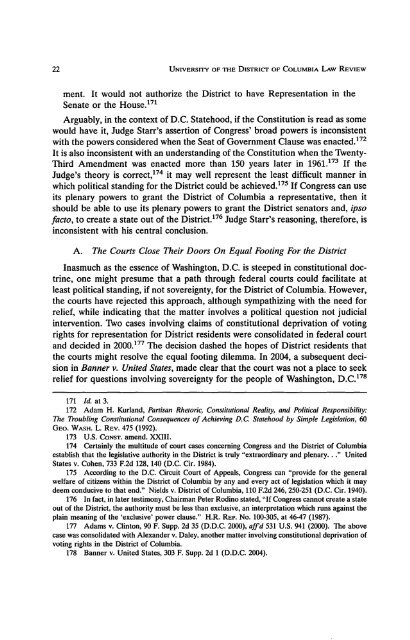Download - UDC Law Review
Download - UDC Law Review
Download - UDC Law Review
You also want an ePaper? Increase the reach of your titles
YUMPU automatically turns print PDFs into web optimized ePapers that Google loves.
22 UNIVERSITY OF THE DISTRlcr OF COLUMBIA LAW REVIEWment. It would not authorize the District to have Representation in theSenate or the House. l71Arguably, in the context of D.C. Statehood, if the Constitution is read as somewould have it, Judge Starr's assertion of Congress' broad powers is inconsistentwith the powers considered when the Seat of Government Clause was enacted. 172It is also inconsistent with an understanding of the Constitution when the TwentyThird Amendment was enacted more than 150 years later in 1961. 173 If theJudge's theory is correct,174 it may well represent the least difficult manner inwhich political standing for the District could be achieved. 175 If Congress can useits plenary powers to grant the District of Columbia a representative, then itshould be able to use its plenary powers to grant the District senators and, ipsofacto, to create a state out of the District. 176 Judge Starr's reasoning, therefore, isinconsistent with his central conclusion.A. The Courts Close Their Doors On Equal Footing For the DistrictInasmuch as the essence of Washington, D.C. is steeped in constitutional doctrine,one might presume that a path through federal courts could facilitate atleast political standing, if not sovereignty, for the District of Columbia. However,the courts have rejected this approach, although sympathizing with the need forrelief, while indicating that the matter involves a political question not judicialintervention. Two cases involving claims of constitutional deprivation of votingrights for representation for District residents were consolidated in federal courtand decided in 2000. 177 The decision dashed the hopes of District residents thatthe courts might resolve the equal footing dilemma. In 2004, a subsequent decisionin Banner v. United States, made clear that the court was not a place to seekrelief for questions involving sovereignty for the people of Washington, D.C. 178171 Id. at 3.172 Adam H. Kurland, Partisan Rhetoric, Constitutional Reality, and Political Responsibility:The Troubling Constitutional Consequences of Achieving D.C. Statehood by Simple Legislation, 60GEO. WASH. L. REV. 475 (1992).173 U.S. CONST. amend. XXIII.174 Certainly the multitude of court cases concerning Congress and the District of Columbiaestablish that the legislative authority in the District is truly "extraordinary and plenary ... " UnitedStates v. Cohen, 733 F.2d 128, 140 (D.C. Cir. 1984).175 According to the D.C. Circuit Court of Appeals, Congress can "provide for the generalwelfare of citizens within the District of Columbia by any and every act of legislation which it maydeem conducive to that end." Nields v. District of Columbia, 110 F.2d 246, 250-251 (D.C. Cir. 1940).176 In fact, in later testimony, Chairman Peter Rodino stated, "If Congress cannot create a stateout of the District, the authority must be less than exclusive, an interpretation which runs against theplain meaning of the 'exclusive' power clause." H.R. REP. No. 100-305, at 46-47 (1987).177 Adams v. Clinton, 90 F. Supp. 2d 35 (D.D.C. 2000), affd 531 U.S. 941 (2000). The abovecase was consolidated with Alexander v. Daley, another matter involving constitutional deprivation ofvoting rights in the District of Columbia.178 Banner v. United States, 303 F. Supp. 2d 1 (D.D.C. 2004).














